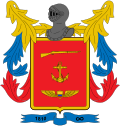| Military Forces of Colombia | |
|---|---|
| Fuerzas Militares de Colombia | |
 The tri-service badge | |
| Founded | 7 August 1819 (206 years, 183 days) |
| Service branches | |
| Headquarters | Ministry of National Defense, Bogota D.C. |
| Leadership | |
| Commander-in-Chief | President Gustavo Petro |
| Minister of Defense | Pedro Arnulfo Sànchez |
| General Commander | Admiral Francisco Cubides |
| Personnel | |
| Military age | 18 |
| Conscription | 18 months (Army and Aerospace Force) 24 months (Navy) 12 Months (National Police) |
| Active personnel | 429 000 [1] |
| Reserve personnel | 998 000 [1] |
| Expenditure | |
| Budget | 60 Trillion COP US$14.37 billion (2025) [2] |
| Percent of GDP | 4.1% (2025) [2] |
| Industry | |
| Domestic suppliers | CIAC COTECMAR INDUMIL |
| Foreign suppliers | |
| Related articles | |
| History | Military history of Colombia |
| Ranks | Military ranks |
The Military Forces of Colombia (Spanish: Fuerzas Militares de Colombia) are the unified armed forces of the Republic of Colombia. They consist of the Colombian Army, the Colombian Navy and the Colombian Aerospace Force. The National Police of Colombia, although technically not part of the military, is controlled and administered by the Ministry of National Defence, and national conscription also includes service in the National Police, thus making it a de facto gendarmerie and a branch of the military. The President of Colombia is the military's commander in chief, and helps formulate defense policy through the Ministry of National Defence, which is in charge of day-to-day operations.
Contents
- Services
- Personnel
- Dependencies
- Funding
- Rank Insignia
- See also
- References and notes
- External links
- Other Links
- Bibliography
The Military Forces of Colombia have their roots in the Army of the Commoners (Ejército de los Comuneros), which was formed on 7 August 1819 – before the establishment of the present day Colombia – to meet the demands of the Revolutionary War against the Spanish Empire. After their triumph in the war, the Army of the Commoners disbanded, and the Congress of Angostura created the Gran Colombian Army to replace it, thus establishing the first military service branch of the country.
The Colombian military was operationally involved in World War II and was the only Latin American country to send troops to the Korean War. Ever since the advent of the Colombian Conflict, the Colombian military has been involved in combat, pacification, counter-insurgency, and drug interdiction operations all over the country's national territory. Recently it has participated in counter-piracy efforts in the Horn of Africa under Operation Ocean Shield and Operation Atalanta.
The military of Colombia is the third largest in the Western Hemisphere in terms of active personnel and has the fourth largest expenditure in the Americas, behind the United States Armed Forces, the Canadian Armed Forces and the Brazilian Armed Forces respectively. [3] [4]





